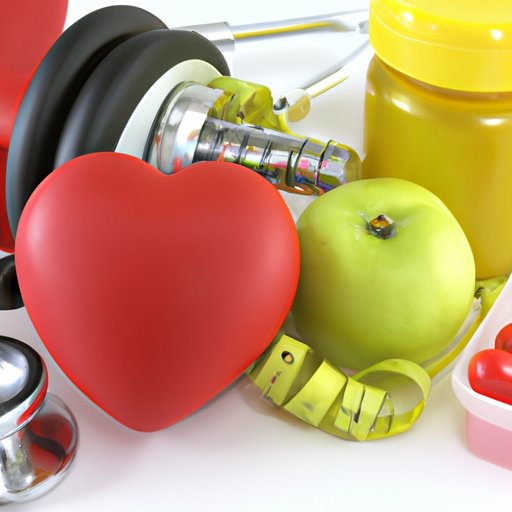
Introduction
High cholesterol is a common health concern that affects millions of people worldwide. Cholesterol is a type of fat that is necessary for our body to function properly. However, too much cholesterol in our blood can cause serious health problems such as heart disease and stroke. If you’re someone struggling with high cholesterol, don’t worry, you’re not alone. In this article, we’ll explore how to get cholesterol down and lead a healthier life.
Understanding Cholesterol
To understand how to lower cholesterol, we first need to know what it is. Cholesterol is a waxy, fat-like substance that is found in all cells of the body. It plays an important role in many bodily functions such as hormone production and digestion. There are two types of cholesterol: low-density lipoprotein (LDL) and high-density lipoprotein (HDL).
LDL is commonly known as “bad” cholesterol because it can build up in the walls of arteries and lead to blockages, which can cause heart attacks or strokes. HDL, on the other hand, is known as “good” cholesterol because it helps remove LDL from the bloodstream.
How to Lower Cholesterol
Now that we understand what cholesterol is and why it matters, let’s explore some ways to lower it.
A. Switch to a Heart-Healthy Diet
One of the most effective ways to lower cholesterol is through your diet. A heart-healthy diet involves consuming foods that are high in fiber, omega-3 fatty acids, and unsaturated fats while avoiding foods that are high in saturated and trans fats.
Foods to eat:
- Fruits and vegetables
- Whole grains
- Lean proteins such as fish and poultry
- Legumes (beans, lentils, peas)
- Nuts and seeds
- Healthy fats such as avocado, olive oil, and nuts
Foods to avoid:
- Fatty meats such as beef, pork, and lamb
- Processed meats such as sausages and bacon
- Butter and full-fat dairy products
- Trans fats such as fried foods, baked goods, and packaged snacks
- Sugar-sweetened drinks and desserts
B. Increase Physical Activity
Exercise plays a crucial role in maintaining a healthy weight and improving heart health. It can also help raise HDL (“good”) cholesterol levels and lower LDL (“bad”) cholesterol levels. The American Heart Association recommends at least 150 minutes of moderate-intensity exercise per week.
Examples of moderate-intensity exercise:
- Brisk walking
- Cycling
- Dancing
- Swimming
C. Limit Alcohol Intake
Drinking alcohol in moderation can have some health benefits, but excessive alcohol consumption can increase your cholesterol levels. Heavy drinking can cause liver damage and lead to high blood pressure, which can cause long-term health problems.
The American Heart Association recommends no more than one drink per day for women and two drinks per day for men.
D. Quit Smoking
Smoking is not only bad for your lungs, but it also has a negative impact on your cholesterol levels. Chemicals in cigarettes can damage your blood vessels and decrease your HDL (“good”) cholesterol levels.
If you’re a smoker, quitting is one of the best things you can do for your health. Talk to your doctor about effective smoking cessation methods such as nicotine replacement therapy or prescription medications.
E. Consider Medication
In some cases, medication may be necessary to lower cholesterol levels. Statins are commonly prescribed medications that help block the production of cholesterol in the liver.
Your doctor may also recommend other medications such as bile acid sequestrants or cholesterol absorption inhibitors.
F. Lose Weight
If you’re overweight, losing even a small amount of weight can have a positive impact on your cholesterol levels. Excess weight can contribute to high cholesterol because it increases the number of LDL (“bad”) particles in your blood.
Healthy weight loss involves a combination of a heart-healthy diet and regular physical activity. Talk to your doctor about setting realistic weight loss goals and methods to achieve them.
G. Reduce Stress
Stress can have a negative impact on your cholesterol levels by increasing the amount of LDL (“bad”) cholesterol in your blood.
Reduce stress in your life by:
- Practicing relaxation techniques such as deep breathing or meditation
- Engaging in stress-reducing activities such as yoga or tai chi
- Maintaining a strong support network of family and friends
Conclusion
High cholesterol can be a serious health concern, but there are many ways to lower it. Through a combination of a heart-healthy diet, regular physical activity, limiting alcohol intake, quitting smoking, considering medication, healthy weight loss, and stress reduction, you can improve your cholesterol levels and lead a healthier life.





